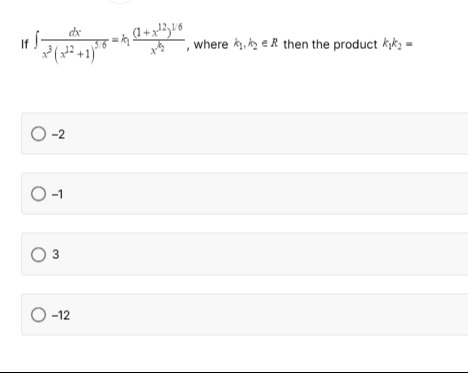Question
Question: If $\int \frac{dx}{x^3(x^{12}+1)^{\frac{5}{6}}} = k_1 \frac{(1+x^{12})^{\frac{1}{6}}}{x^{k_2}}$, whe...
If ∫x3(x12+1)65dx=k1xk2(1+x12)61, where k1,k2∈R then the product k1k2=

-2
-1
3
-12
-1
Solution
To evaluate the integral ∫x3(x12+1)65dx, we follow these steps:
-
Rewrite the integrand: Factor out x12 from the term (x12+1)65 in the denominator. (x12+1)65=(x12(1+x121))65=(x12)65(1+x−12)65=x10(1+x−12)65 Now substitute this back into the integral: ∫x3⋅x10(1+x−12)65dx=∫x13(1+x−12)65dx This can be written as: ∫x−13(1+x−12)−65dx
-
Perform substitution: Let u=1+x−12. Differentiate u with respect to x: dxdu=−12x−13 So, du=−12x−13dx, which implies x−13dx=−121du.
-
Integrate with respect to u: Substitute u and du into the integral: ∫u−65(−121)du=−121∫u−65du Now integrate u−65: ∫u−65du=−65+1u−65+1+C=61u61+C=6u61+C Substitute this back into the expression for the integral: −121(6u61)+C=−21u61+C
-
Substitute back to x: Replace u with 1+x−12: −21(1+x−12)61+C Rewrite (1+x−12)61 to match the given form: (1+x−12)61=(x12x12+1)61=(x12)61(x12+1)61=x2(x12+1)61 So the integral becomes: ∫x3(x12+1)65dx=−21x2(x12+1)61+C
-
Identify k1 and k2: The problem states that the integral is equal to k1xk2(1+x12)61. Comparing our result with the given form: k1=−21 k2=2
-
Calculate the product k1k2: k1k2=(−21)×2=−1
The final answer is −1.
Explanation of the solution: The integral ∫x3(x12+1)65dx is solved by first rewriting the denominator as x13(1+x−12)65. Then, a substitution u=1+x−12 is made, which transforms x−13dx into −121du. The integral becomes −121∫u−65du, which evaluates to −21u61. Substituting back u=1+x−12 and simplifying, we get −21x2(x12+1)61. Comparing this with the given form k1xk2(1+x12)61, we find k1=−21 and k2=2. The product k1k2=(−21)(2)=−1.
